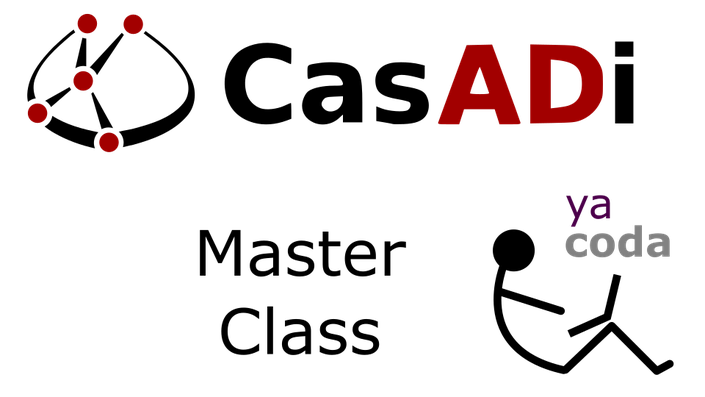
Target audience
Academic/industrial researchers or tool-developers that seek practical ways to tackle large/complex continuous optimization problems, and optimal control problems in particular.
CasADi?
Originating from KU Leuven’s “Optimization in Engineering Center” under guidance of prof. Moritz Diehl, CasADi [1] is an open-source software framework for nonlinear optimization and algorithmic differentiation. It facilitates rapid - yet efficient - implementation of different methods for numerical optimal control, both in an offline context and for nonlinear model predictive control.
Tutor
Joris Gillis obtained his PhD in electrical engineering at KU Leuven in 2015. Currently a post-doc at MECO, KU Leuven and part-time freelancer through Yacoda, he pursues large-scale applications in optimal control and is highly active as a main developer of CasADi since 2010.
[1] Joel A. E. Andersson, Joris Gillis, Greg Horn, James B. Rawlings, M. Diehl, “CasADi – A software framework for nonlinear optimization and optimal control,” Mathematical Programming Computation, 2018.
Covered topics
Newton-type methods for constrained nonlinear programming – integration methods – direct transcription of optimal control problems (OCP) – model predictive control (MPC) – CasADi syntax and best practices
Format
This self-paced online course is a 1-to-1 reflection of the live course taught yearly in Leuven, Belgium. Seminars paired with computer exercises. The seminars provide a bird’s-eye view on optimization and optimal control, serving as teaser for further study or as recap for the experienced. The computer exercises aim to deepen understanding of the theory, and leave the participants well-equipped to solve a broad range of problems using CasADi by themselves.

Prerequisites
Basic mathematical skills (analysis, calculus, linear algebra) are required. Experience with programming in MATLAB/Octave or Python is required.
Practicalities
You may use the comments in each module to ask questions on the course content. Following the course properly (i.e. doing the exercises and watching all 10 hours of video material) will take approximately 3 days.
A working installation of either Matlab or Python is needed.
Preview
Visit module 1 on rootfinding on rootfinding to see if the teaching style matches your expectations.
Detailed Course Curriculum
Module 1: Rootfinding on a nonlinear set of equations: Newton's method
- Understand the Newton step in a high-dimensional search space
- Understand how (approximated) Jacobians are central to the Newton's method
- Using CasADi to evaluate Jacobians
- Understand some common failure modes of Newton's method
Module 2: CasADi basics: Expressions graphs and Functions
- Get a clear mental image on basic CasADi concepts
- Get acquainted with a consistent vocabulary to talk about CasADi concepts
- Reason about CasADi types
- Learn to read CasADi error messages
Module 3: Constraint nonlinear programming: Newton-type methods and interior point
- Understand the conditions for optimality
- Understand how Newton-type methods orginate from rootfinding
- Learn how to build an SQP and interior point method in CasADi
Module 4: Integration of CasADi integrator, rootfinder and nonlinear programming
- Learn how to compose CasADi building blocks to solve non-trivial engineering problems
Module 5: CasADi Opti stack for easy nonlinear programming
- Learn how to use Opti for nonlinear programming
- Learn some simple debugging skills for common failure cases of nonlinear programming
Module 6: Nonlinear programming for fitting problems
- Understand how several fitting algorithms are related
- Learn how to use L1 and L2 norms in CasADi
- Understand the robustness property of L1 norm
- Solve a parameter estimation problem from scratch in Opti
Module 7: Direct methods for optimal control
- Understand single shooting and multipleshooting
- Understand the sparsity structure present in multiple shooting
- Learn how to choose between single- and multiple shooting
Module 8: Implementing model predictive control in CasADi
- Understand MPC as an extension of optimal control
- Learn how to speed up a CasADi MPC problem
- Understand that MPC does not necessarily lead to a good controller
Module 9: Time-optimal control in CasADi
- Understand how time-optimal control is intrinsically harder
- Understand the difference between trajectory tracking and path tracking
- Learn how to implement periodic racing problems
- Learn how to interpret Langrange multipliers
Module 10: A demonstration of stochastic and robust constraints in optimal control
- Learn how CasADi can be applied outside 'standard' optimal control
Module 11: Perform integration of system dynamics with collocation.
- Get an intuive understanding of a collocation method
- Understand the connection to rootfinding
Module 12: Another direct method for optimal control: direct collocation
- Understand how direct collocation differs from multiple shooting with a collocation integrator
- Learn how to implement direct collocation
- Understand the sparsity structure resulting from direct collocation
- Learn the benefits of direct collocation



